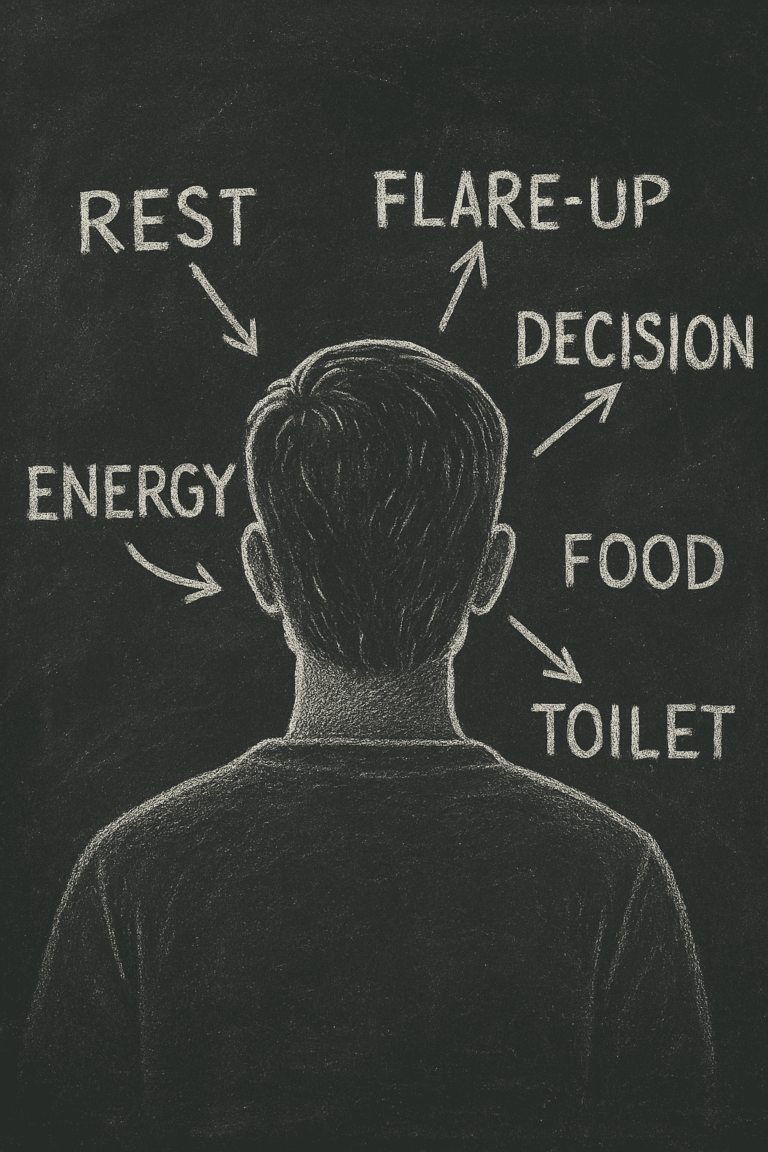Living with Crohn’s Disease often feels like you’re trying to keep a leaky boat afloat in a storm, except the weather forecast is written in medical jargon. The stress, anxiety, and unpredictable flares don’t just knock on your door—they set up camp in your living room. And the worst part? No one else can see the chaos. If you’ve ever found yourself wide awake at 3am, gripped by the sort of stress only Crohn’s Disease can deliver, you’re in good company. In this post, I’ll break down the oddball psychology behind stress, and share practical, no-nonsense strategies for managing stress with Crohn’s Disease—because even if you can’t control your gut, you can outwit your own brain.
The Hidden Side of Crohn’s Disease
Crohn’s Disease doesn’t just bother your intestines; it’s an expert at gatecrashing your mental peace. The fatigue, the discomfort, the perpetual dance with uncertainty—it’s enough to turn even the most stoic among us into raving insomniacs. Here’s a behavioural quirk: stress and anxiety aren’t simply side effects. They’re amplifiers. Left unchecked, they can make minor symptoms feel like catastrophes. The trick? Recognise the emotional ambush early. Talk, rant, or even write to your consultant about how your head’s handling the stress. Sometimes, the best medicine is swapping war stories with someone who gets it.
Clever Ways to Manage Stress and Anxiety
Mindfulness Meditation
I’ll admit it: when I first heard about mindfulness, I thought it was just another way of telling people to ‘think happy thoughts’ while their insides riot. But here’s the twist—practising mindfulness isn’t about pretending everything’s fine. It’s about noticing what your mind is up to when stress barges in, and gently guiding it back. Even five minutes of slow breathing or a guided session can make Crohn’s-induced chaos feel a touch more manageable. There’s an app for every taste—pick one that doesn’t make you want to hurl your phone across the room.
Gratitude Journaling
This isn’t about toxic positivity. It’s about noticing the one thing that went slightly right today, even if that thing is just a cup of tea that stayed down. Write it down. The simple act of acknowledging a small win rewires your brain—literally—to focus less on fear and more on progress. Over time, your head gets better at spotting what’s working, not just what’s going wrong.

Rethinking Triggers and Stress Patterns with Crohn’s Disease
Let’s get psychological for a moment. Crohn’s Disease teaches you to be a detective—always looking for the culprit behind the chaos. But stress isn’t just a passive passenger. The mind and gut are old pen pals, sending letters back and forth, with stress as the not-so-helpful postman. It’s no coincidence that stress ramps up right before a flare, or that a bad day at work somehow ends in stomach pain.
Instead of blaming yourself, treat stress as a pattern you can outwit. For example, try tracking your symptoms alongside stressful events. You might spot that certain meetings, family gatherings, or even the weather set your nerves jangling. Use that insight to get one step ahead—plan your self-care arsenal in advance, even if it’s just a five-minute breather or a private rant in your phone notes.
And here’s a curveball: sometimes, the pursuit of ‘perfect health’ is the real stressor. Trying to outsmart Crohn’s at every turn can leave you more frazzled than the illness itself. Give yourself permission to drop the ball now and then. The aim isn’t a stress-free life—it’s a life where stress isn’t in charge.
Behavioural science suggests that rituals—tiny, predictable actions—are powerful for anxious brains. Something as small as making your morning cuppa the same way each day can bring a sense of stability. Set reminders to stretch, listen to a calming playlist, or even just open a window for fresh air. These are not grand acts, but anchors that stop stress from drifting too far.
Finally, don’t underestimate the power of talking. Not performative, hashtagged sharing—just a message to someone who actually gets it, or a quick moan in a support forum. Crohn’s is a master at making you feel like you’re the only one at the party with stomach issues. The truth? There are thousands of us gatecrashing this bash, and a bit of camaraderie can be the best antidote to stress.
The Case for Self-Care
If self-care sounds like something for spa-goers and wellness influencers, let’s reframe it: self-care is the art of doing what keeps you sane when Crohn’s Disease tries to call the shots. That could mean watching a comedy show in bed, quietly swearing at a sudoku puzzle, or just shutting the world out with noise-cancelling headphones. The real hack is giving yourself permission. Your body’s running a marathon—sometimes, the best you can do is cheer yourself on from the sofa.

Why Humour Deserves a Place at the Table
If laughter is medicine, it’s the sort you don’t need a prescription for—and the side effects are mostly just odd looks from strangers. Seek out whatever makes you snort with laughter, from internet memes to the most ridiculous sitcoms. Crohn’s Disease is a serious business, but you don’t have to take it seriously every minute. Humour isn’t about denial; it’s a way to stop your illness from stealing the punchline.
Living with Crohn’s Disease throws enough curveballs to fill a cricket match, but you don’t have to field them alone. Name the stress, call it out, and then do something—no matter how small—that makes today slightly better than yesterday. Sometimes, survival looks like a good cup of tea, a phone call with a mate, or laughing at the absurdity of it all. The trick is to outsmart the stress before it decides to redecorate your mind.
Be direct: tell your doctor about your mental health struggles, just as you would your physical symptoms. GPs and specialists see this all the time.
Managing stress with Crohn’s Disease isn’t about pretending every day’s a picnic—it’s about giving yourself permission to take it easy when things are rough. On the worst days, start by doing just one small thing that brings comfort, like sipping your favourite tea, texting a mate, or hiding under a blanket with a good film. Don’t feel guilty if your to-do list gets ignored; your body is busy enough managing Crohn’s symptoms and flares. Stress relief on bad days is all about lowering the bar and focusing on practical coping strategies—think gentle breathing, distraction, or even a walk outside if you’re able. You’re not failing at life; you’re managing Crohn’s stress in the most human way possible.
Absolutely—mindfulness techniques can be surprisingly powerful when it comes to managing anxiety with Crohn’s Disease. Mindfulness is just about noticing your thoughts, feelings, and physical symptoms without judging them. If your mind’s racing about your next flare-up, a few minutes of focused breathing or guided meditation can calm the anxiety and dial down the tension. Studies show that regular mindfulness practice helps Crohn’s sufferers manage both emotional stress and physical discomfort, breaking the cycle where anxiety makes symptoms worse. It doesn’t require incense or a yoga mat—just a bit of patience and an open mind
The best self-care for Crohn’s Disease is the sort that actually fits your life, not someone else’s highlight reel. Many people find that gentle activities—like stretching, listening to music, or keeping a gratitude journal—can ease stress and promote well-being. Creating a daily ritual, such as a quiet cuppa in the morning or a short walk after meals, gives your day structure and helps calm a frazzled nervous system. Don’t underestimate the power of laughter, connecting with others in a Crohn’s support group, or even zoning out to a silly TV show. Self-care routines for Crohn’s stress are most effective when they’re regular, realistic, and bring a bit of comfort or joy.
Yes, anxiety and depression are very common with Crohn’s Disease—and you’re definitely not alone in feeling this way. Living with a chronic illness like Crohn’s can take a toll on your mental health, especially when symptoms flare up or your plans go sideways. Many Crohn’s sufferers report periods of low mood, anxiety, or feeling isolated. It’s completely normal, and it’s nothing to be ashamed of. The good news is there’s lots of support available, from talking therapies and support groups to practical tips for managing mental health alongside your physical symptoms. Reaching out is a strength, not a weakness.
Quick stress relief with Crohn’s Disease doesn’t have to mean a full lifestyle overhaul. Try deep breathing exercises, listening to your favourite upbeat music, or even just stepping outside for a bit of fresh air. A quick chat with a friend, jotting down a few things you’re grateful for, or watching a funny video can break the cycle of Crohn’s stress. Some people find progressive muscle relaxation or a five-minute mindfulness meditation helpful. The key is to experiment and find what works for you—sometimes the simplest strategies are the most effective for managing stress and Crohn’s symptoms in the moment.





